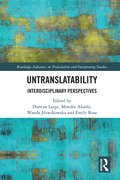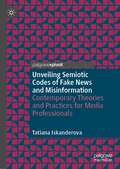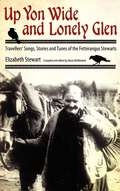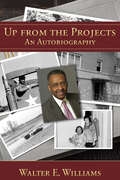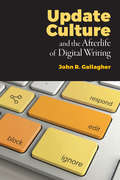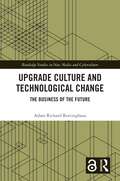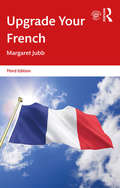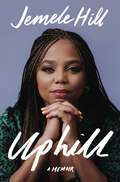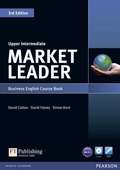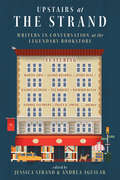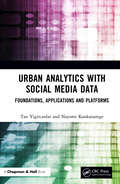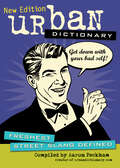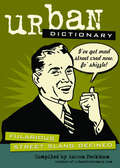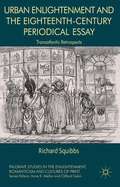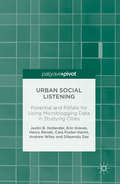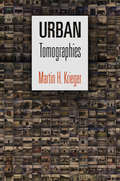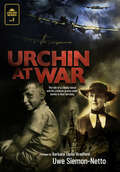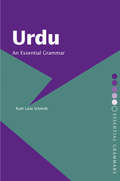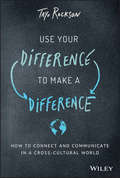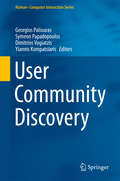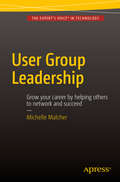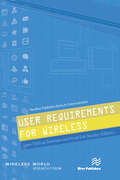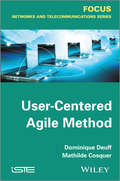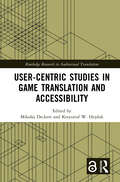- Table View
- List View
Untersuchung an Leistungsverstärkern mit Gegenkopplung
by Robert PauloDer in diesem Buch weiterentwickelte Prozess erlaubt eine Optimierung von HF-Leistungsverstärkern zunächst ohne Gegenkopplung mit Hilfe schneller Wechselspannungssimulationen. Ein passendes Parallelnetzwerk, welches verschiedene Parallelgegenkopplungen enthalten kann, wird im Anschluss rein analytisch hinzugefügt. Die Optimierung kann auf Verstärker in einfacher Emitterschaltung, wahlweise mit Kaskodetransistor und mit einer beliebigen Anzahl aufgestapelter Transistoren angewendet werden.Ein weiterer Schwerpunkt ist die Stabilitätsbetrachtung. Es wird gezeigt, wie eine vermaschte Rückführung im Layout eine deutliche Verbesserung der Stabilität bewirkt. Hierfür war eine Erweiterung der klassischen Analyse für die Schleifenverstärkung notwendig.Der Autor führt den Leser durch die analytischen Betrachtungen der einzelnen Schwerpunkte hin zu den simulativen Untersuchungen und verifiziert die Ergebnisse anhand von Messergebnissen gefertigter Verstärkerschaltungen in einer BiCMOS-Technologie. Dem Leser werden zudem beispielhaft sowohl für die Verstärkeroptimierung als auch für die Stabilitätsuntersuchung leistungsstarke Werkzeuge für die Einbettung in eine CAD-Umgebung an die Hand gegeben.
Untranslatability: Interdisciplinary Perspectives (Routledge Advances in Translation and Interpreting Studies)
by Emily Rose Duncan Large Motoko Akashi Wanda JózwikowskaThis volume is the first of its kind to explore the notion of untranslatability from a wide variety of interdisciplinary perspectives and its implications within the broader context of translation studies. Featuring contributions from both leading authorities and emerging scholars in the field, the book looks to go beyond traditional comparisons of target texts and their sources to more rigorously investigate the myriad ways in which the term untranslatability is both conceptualized and applied. The first half of the volume focuses on untranslatability as a theoretical or philosophical construct, both to ground and extend the term’s conceptual remit, while the second half is composed of case studies in which the term is applied and contextualized in a diverse set of literary text types and genres, including poetry, philosophical works, song lyrics, memoir, and scripture. A final chapter examines untranslatability in the real world and the challenges it brings in practical contexts. Extending the conversation in this burgeoning contemporary debate, this volume is key reading for graduate students and researchers in translation studies, comparative literature, gender studies, and philosophy of language. The editors are grateful to the University of East Anglia Faculty of Arts and Humanities, who supported the book with a publication grant.
Unveiling Semiotic Codes of Fake News and Misinformation: Contemporary Theories and Practices for Media Professionals
by Tatiana IskanderovaThis book offers a comprehensive exploration of the widespread issue of fake news and misinformation. Using real-life examples and semiotic theory, the author demonstrates how language, images, and symbols are being utilized in media production and distribution with the intention of altering the perception of individuals and shaping their beliefs. The book also addresses how social and cultural factors influence the spread of information and emphasizes the importance of understanding the context in which information is being received and shared. This book is a must-read for anyone seeking to understand the impact of fake news and misinformation on society, especially academics, researchers, journalists, policymakers, and media professionals at all levels. The author provides contemporary theories and practical strategies to navigate the complex and ever-changing media landscape.
Up Yon Wide and Lonely Glen: Travellers' Songs, Stories and Tunes of the Fetterangus Stewarts
by Elizabeth StewartElizabeth Stewart is a highly acclaimed singer, pianist, and accordionist whose reputation has spread widely not only as an outstanding musician but as the principal inheritor and advocate of her family and their music. First discovered by folklorists in the 1950s, the Stewarts of Fetterangus, including Elizabeth's mother Jean, her uncle Ned, and her aunt Lucy, have had immense musical influence. Lucy in particular became a celebrated ballad singer and in 1961 Smithsonian Folkways released a collection of her classic ballad recordings that brought the family's music and name to an international audience. Up Yon Wide and Lonely Glen is a significant memoir of Scottish Traveller life, containing stories, music, and songs from this prominent Traveller family. The book is the result of a close partnership between Elizabeth Stewart and Scottish folk singer and writer Alison McMorland. It details the ancestral history of Elizabeth Stewart's family, the story of her mother, the story of her aunt, and her own life story, framing and contextualizing the music and song examples and showing how totally integrated these art forms are with daily life. It is a remarkable portrait of a Traveller family from the perspective of its matrilineal line. The narrative, spanning five generations and written in Scots, captures the rhythms and idioms of Elizabeth Stewart's speaking voice and is extraordinary from a musical, cultural, sociological, and historical point of view. The book features 145 songs, eight original piano compositions, folktale versions, rhymes and riddles, and eighty fascinating illustrations, from the family of Elizabeth, her mother Jean (1912–1962) and her aunt Lucy (1901–1982). In addition, there are notes on the songs and a series of appendices. Up Yon Wide and Lonely Glen will appeal to those interested in traditional music, folklore, and folk song—and in particular, Scottish tradition.
Up from the Projects: An Autobiography
by Walter E. WilliamsNationally syndicated columnist and prolific author Walter E. Williams recalls some of the highlights and turning points of his life. From his lower middle class beginnings in a mixed but predominantly black neighborhood in West Philadelphia to his department chair at George Mason University, Williams tells an "only in America" story of a life of achievement.
Update Culture and the Afterlife of Digital Writing
by John R GallagherUpdate Culture and the Afterlife of Digital Writing explores “neglected circulatory writing processes” to better understand why and how digital writers compose, revise, and deliver arguments that undergo sometimes constant revision. John R. Gallagher also looks at how digital writers respond to comments, develop a brand, and evolve their arguments—all post-publication. With the advent of easy-to-use websites, ordinary people have become internet writers, disseminating their texts to large audiences. Social media sites enable writers’ audiences to communicate back to the them, instantly and often. Even professional writers work within interfaces that place comments adjacent to their text, privileging the audience’s voice. Thus, writers face the prospect of attending to their writing after they deliver their initial arguments. Update Culture and the Afterlife of Digital Writing describes the conditions that encourage “published” texts to be revisited. It demonstrates—through forty case studies of Amazon reviewers, redditors, and established journalists—how writers consider the timing, attention, and management of their writing under these ever-evolving conditions. Online culture, from social media to blog posts, requires a responsiveness to readers that is rarely duplicated in print and requires writers to consistently reread, edit, and update texts, a process often invisible to readers. This book takes questions of circulation online and shows, via interviews with both writers and participatory audience members, that writing studies must contend with writing’s afterlife. It will be of interest to researchers, scholars, and students of writing studies and the fields of rhetoric, communication, education, technical communication, digital writing, and social media, as well as all content creators interested in learning how to create more effective posts, comments, replies, and reviews.
Upgrade Culture and Technological Change: The Business of the Future (Routledge Studies in New Media and Cyberculture)
by Adam Richard RottinghausThis book explores the origin and future of "upgrade culture," a collection of cultural habits and orientations based on the assumption that new technologies will rapidly, perpetually, and inevitably emerge. By analyzing discourses of technological change and the practices of marketing workers inside the consumer technology industry between the early 1980s and the late 2010s, the book describes the genesis, maintenance, and future of upgrade culture. Based on archival and popular sources, first-hand interviews with a range of industry professionals, and participant observations at industry-only events, the book attends to issues both intimate to the culture of marketing work and structural to the organization of the consumer technology industry. This book will have a broad appeal to social/cultural theorists of technology, marketing, and consumerism, as well as to scholars in business history, communication, cultural studies, media studies, sociology, and anthropology.
Upgrade Your French
by Margaret JubbUpgrade Your French is the ideal guide for students looking to improve their written French rapidly. It offers a complete revision programme to improve your skills, focusing on three key strategies for improving your written French: Eliminating common errors Increasing and consolidating vocabulary Using a wider range of expression and sentence structure This third edition includes enhanced coverage of the subjunctive and a new section on prepositions, new revision exercises at the end of each chapter (including translation sentences), and a companion website with further practice exercises. This is the ideal book for all intermediate students looking for a simple way to improve their French fast.
Uphill: A Memoir
by Jemele HillOne of Oprah Daily's Best Fall Nonfiction Books of 2022An empowering, unabashedly bold memoir by the Atlantic journalist and former ESPN SportsCenter coanchor about overcoming a legacy of pain and forging a new path, no matter how uphill life’s battles might be.Jemele Hill’s world came crashing down when she called President Trump a “white supremacist”; the White House wanted her fired from ESPN, and she was deluged with death threats. But Hill had faced tougher adversaries growing up in Detroit than a tweeting president. Beneath the exterior of one of the most recognizable journalists in America was a need—a calling—to break her family’s cycle of intergenerational trauma. Born in the middle of a lively routine Friday night Monopoly game to a teen mother and a heroin-addicted father, Hill constantly adjusted to the harsh realities of not only her own childhood but the inherited generational pain of her mother and grandmother. Her escape was writing. Hill’s mother was less than impressed with the brassy and bold free expression of her diary, but Hill never stopped discovering and amplifying her voice. Through hard work and a constant willingness to learn, Hill rose from newspaper reporter to columnist to new heights as the coanchor for ESPN’s revered SportsCenter. Soon, she earned respect and support for her fearless opinions and unshakable confidence, as well as a reputation as a trusted journalist who speaks her mind with truth and conviction. In Jemele Hill’s journey Uphill, she shares the whole story of her work, the women of her family, and her complicated relationship with God in an unapologetic, character-rich, and eloquent memoir.
Upper Intermediate Market Leader 3rd edition
by David Cotton David Falvey Simon KentThis five-level course uses authoritative, authentic sources from the Financial Times to explore topical business issues and builds the professional standard of language needed to communicate in the modern world of business.
Upstairs at the Strand: Writers in Conversation at the Legendary Bookstore
by Jessica Strand Andrea AguilarRevelatory conversations between renowned writers at New York City's legendary bookstore. For nearly ninety years, the Strand Book Store has been a New York institution, a legendary mecca for readers throughout the five boroughs, across the country, and around the world. Featuring freewheeling and behind-the-scenes conversations between renowned novelists, playwrights, and poets on how they work, think, and live, Upstairs at the Strand captures the happy collision of books and ideas in the Strand's famed reading series in its Rare Book Room. Upstairs at the Strand is indispensable for aspiring writers, readers of contemporary literature, and devoted fans of the 18 Miles of Books at the Strand Book Store. Contributors include: Renata Adler * Edward Albee * Hilton Als * Paul Auster * Blake Bailey * Alison Bechdel * Tina Chang * Junot Díaz * Deborah Eisenberg * Rivka Galchen * A. M. Holmes * Hari Kunzru * Rachel Kushner * Wendy Lesser * D. T. Max * Leigh Newman * Téa Obreht * Robert Pinsky * Katie Roiphe * George Saunders * David Shields * Charles Simic * Tracy K. Smith * Mark Strand * and Charles Wright.
Urban Analytics with Social Media Data: Foundations, Applications and Platforms
by Tan Yigitcanlar Nayomi KankanamgeThe use of data science and urban analytics has become a defining feature of smart cities. This timely book is a clear guide to the use of social media data for urban analytics. The book presents the foundations of urban analytics with social media data, along with real-world applications and insights on the platforms we use today. It looks at social media analytics platforms, cyberphysical data analytics platforms, crowd detection platforms, City-as-a-Platform, and city-as-a-sensor for platform urbanism. The book provides examples to illustrate how we apply and analyse social media data to determine disaster severity, assist authorities with pandemic policy, and capture public perception of smart cities. This will be a useful reference for those involved with and researching social, data, and urban analytics and informatics.
Urban Dictionary: Freshest Street Slang Defined (Urban Dictionary Ser. #3)
by Aaron PeckhamThe ultimate authority on street slang presents a new volume of delightfully dirty, surprisingly insightful terms and phrases.In 1999, Aaron Peckham established UrbanDictionary.com, inviting users to define their world by compiling the most epic collection of slang in history. Since then, the site has skyrocketed in popularity, amassing thousands of definitions and edumacating millions. Users submit about 2,300 new entries every day!In this totally and awesomely revised edition of the best-selling original, readers will find defs—mostly new, some updated, and all fularious—for the most current word creations.
Urban Dictionary: Fularious Street Slang Defined (Urban Dictionary Ser. #1)
by Aaron PeckhamThe creator of Urban Dictionary shares a compendium of the site&’s funniest, weirdest, and truest entries. Since 1999, UrbanDictionary.com has become the undisputed authority on contemporary slang. The site&’s creator, Aaron Peckham, invites its ever-expanding fanbase to submit new words and definitions. For Urban Dictionary: Fularious Street Slang Defined, Peckham has curated a choice selection of terms that will definitely earn you street cred, and help newbies avoid confusing shank with skank.
Urban Enlightenment and the Eighteenth-Century Periodical Essay
by Richard SquibbsUrban Enlightenment offers the first literary history of the British periodical essay spanning the entire eighteenth century, and the first to study the genre's development and cultural impact in a transatlantic context.
Urban Social Listening
by Justin B. Hollander Erin Graves Henry Renkski Cara Foster-Karim Andrew Wiley Dibyendu DasThis book analyses new software tools and social media data that can be used to explore the attitudes of people in urban places. It reports on the findings of several research projects that have have experimented with using microblogging data in conjunction with diverse quantitative and qualitative methods, including content analysis and advanced multivariate statistics. Applied researchers, planners and policy makers have only recently begun to explore the potential of Big Data to help understand social attitudes and to potentially inform local policy and development decisions. This book provides an original analysis into how Twitter can be used to describe the urban experience and people's perception of place, as well as offering significant implications for public policy. It will be of great interest to researchers in human geography, social media, cultural studies and public policy.
Urban Tomographies (The City in the Twenty-First Century)
by Martin H. KriegerTomography is a method of exploring a phenomenon through a large number of examples or perspectives. In medical tomography, such as a CAT scan, two-dimensional slices or images of a three-dimensional organ are used to envision the organ itself. Urban tomography applies the same approach to the study of city life. To appreciate different aspects of a community, from infrastructure to work to worship, urban planning expert Martin H. Krieger scans the myriad sights and sounds of contemporary Los Angeles. He examines these slices of life in Urban Tomographies.The book begins by introducing tomographic methods and the principles behind them, which are taken from phenomenological philosophy. It draws from the examples of Lee Friedlander and Walker Evans, as well as Denis Diderot, Charles Marville, and Eugène Atget, who documented the many facets of Paris life in three crucial periods. Rather than focus on singular, extraordinary figures and events as do most documentarians, Krieger looks instead at the typical, presenting multiple specific images that call attention to people and activities usually rendered invisible by commonality. He took tens of thousands of photographs of industrial sites, markets, electrical distributing stations, and storefront churches throughout Los Angeles. He also recorded the city's ambient sounds, from the calls of a tamale vendor to the buzz of a workshop saw. Krieger considers these samples from the urban sensorium in this innovative volume, resulting in a thoughtful illumination of the interplay of people with and within the built environment. With numerous maps and photographs, as well as Krieger's unique insights, Urban Tomographies provides an unusually representative and rounded view of the city.
Urchin at War: The Tale of a Leipzig Rascal and his Lutheran Granny under Bombs in Nazi Germany
by Barbara Taylor Bradford Uwe Siemon-NettoWhat was it like to grow up as an urban urchin under bombs in Nazi Germany? Did he have a real childhood? Did he play pranks on grownups, as young rascals do in normal times? Could he be shielded against Nationalist ideology? In Urchin at War, Uwe Siemon-Netto answers these questions in the affirmative with humour and drama. The son of a lawyer blinded in World War I, he describes the parallel universe in which his bourgeois family lived in Leipzig. He vividly writes about the night when his home was bombed out. He had to guide his father over puddles of green flames caused by phosphor to his grandmother's apartment where he discovered hours later that — of all people — Frenchmen had rescued his mother from the flames. He tells the story of how he stole a tram after an air raid, and how his family buried his grand-aunt's right hand because that was the only body part rescuers found under the rubble after her house was hit by a blockbuster bomb. Dr. Siemon-Netto, a journalist and academic, relates how in a country parsonage he was evacuated to, the pro-Nazi pastor beat him up for using French loan words and how he preached on Sundays that Hitler was Germany's saviour, prompting the courageous organist to whisper into the author's ears: "He's lying! He is betraying our Lord!" When the Americans occupied Leipzig on Hitler's birthday in 1945, the author's family feasted on half an egg in mustard sauce each.Urchin at War is an Ode to Omi, his funny and intrepid grandmother Clara Netto, a grande dame who in the air raid shelter taught him basic Lutheran doctrine so well that it led him to interrupt his stellar career as a reporter at age 50 to study theology in Chicago and earn a doctorate in Boston.Urchin at War is the first volume in the 1517 Publishing's Urchin Series about the extraordinary life story of a kid and high school dropout who became a sought-after newsman, who covered the Kennedy assassination and the Vietnam War, and ended up being a Lutheran lay theologian.
Urdu: An Essential Grammar (Routledge Essential Grammars)
by Ruth Laila SchmidtUrdu: An Essential Grammar is a reference guide to the most important aspects of the language as it is used by native speakers today.The complexities of Urdu are set out in short, readable sections. Explanations contain minimal jargon and emphasis has been placed on the aspects of Urdu that pose a particular challenge for English-speaking students.Features include:* language examples throughout in both Urdu script and romanization* user-friendly layout* detailed contents list* comprehensive index.Urdu: An Essential Grammar presents a fresh and accessible description of the language and will prove invaluable to students at all levels.
Use Your Difference to Make a Difference: How to Connect and Communicate in a Cross-Cultural World
by Tayo RocksonBecome more culturally competent in an increasingly diverse world Recent years have seen dramatic changes to several institutions worldwide. Our increasingly interconnected, digitized, and globalized world presents immense opportunities and unique challenges. Modern businesses and schools interact with individuals and organizations from a diverse range of cultural and national backgrounds—increasing the likelihood for miscommunication, errors in strategy, and unintended consequences in the process. This has also spilled into our daily lives and the way we consume information today. Understanding how to navigate these and other pitfalls requires adaptability, nuanced cross-cultural communication, and effective conflict resolution. Use Your Difference to Make a Difference provides readers with a skills-based, actionable plan that transforms differences into agents of inclusiveness, connection, and mutual understanding. This innovative and timely guide illustrates how to leverage differences to move beyond unconscious biases, manage a culturally-diverse workplace, create an environment for more tolerant schooling environments, more trusted media, communicate across borders, find and retain diverse talent, and bridge the gap between working locally and expanding globally. Expert guidance on a comprehensive range of topics—teamwork, leadership styles, information sharing, delegation, supervision, giving and receiving feedback, coaching and motivation, recruiting, managing suppliers and customers, and more—helps you manage the essential aspects of international relationships and cultural awareness. This valuable resource contains the indispensable knowledge required to: Develop self-awareness needed to be a cross-cultural communicator Develop content, messaging techniques, marketing plans, and business strategies that translate across cultural borders Help your employees to better understand and collaborate with clients and colleagues from different backgrounds Help teachers build safe environments for students to be themselves Strengthen cross-cultural competencies in yourself, your team, and your entire organization Understand the cultural, economic, and political factors surrounding our world Use Your Difference to Make a Difference is a must-have resource for any educator, parent, leader, manager, or team member of an organization that interacts with co-workers and customers from diverse cultural backgrounds.
User Community Discovery
by Georgios Paliouras Symeon Papadopoulos Dimitrios Vogiatzis Yiannis KompatsiarisThis book redefines community discovery in the new world of Online Social Networks and Web 2. 0 applications, through real-world problems and applications in the context of the Web, pointing out the current and future challenges of the field. Particular emphasis is placed on the issues of community representation, efficiency and scalability, detection of communities in hypergraphs, such as multi-mode and multi-relational networks, characterization of social media communities and online privacy aspects of online communities. User Community Discovery is for computer scientists, data scientists, social scientists and complex systems researchers, as well as students within these disciplines, while the connections to real-world problem settings and applications makes the book appealing for engineers and practitioners in the industry, in particular those interested in the highly attractive fields of data science and big data analytics.
User Group Leadership
by Michelle MalcherThis book is about starting and sustaining a technology user group. User groups are a wonderful way to connect with local and like-minded professionals for networking and learning. All the forums and social media on the internet can't replace face-to-face time spent discussing problems, upcoming technologies, and other pertinent topics. What every user group needs is leaders to organize meetings, find speakers, and connect the community. What every leader needs is good advice and guidance on how to begin a group and nurture new leadership to keep the group sustainable, and Michelle Malcher provides just that right sort of guidance in her book on User Group Leadership. This book is designed to help you understand what goes into starting and building a user group, giving you the tools and resources to do so. Learn what to expect before your first meeting, in the first three months, and in the first year. Malcher has experience from the local group level on up to the international level with the Independent Oracle User Group. If you're involved in technology and are ready to take on a position of leadership by which to help others network, succeed, and grow, then grab a copy of this book. You won't find a better source of guidance for starting and growing a new group on the technology of your choice. Learn what to know before you ever have your first meeting Prepare for each meeting with a list of things that should be done Grow your local members into future leaders What you'll learn Choose the right motivations for starting a group Build a governance structure and integrate with an umbrella group Locate and book interesting speakers Recruit help to share the administrative burden Grow the next generation of leadership Make a difference in people's careers by helping them grow and network and learn Who this book is for User Group Leadership is aimed at technology professionals interested in networking and learning with like-minded people in their same technology area. The book is especially aimed at the ambitious professional who is ready to step into a leadership role by creating a vibrant user community where no such community currently exists, but one is needed. Table of Contents 1. Development of a User Group 2. User Group Governance 3. Building Leaders and Volunteers 4. User Group Planning 5. User Group Members 6. Challenges 7. Career Development 8. From Techie to Leader 9. Qualities of a User Group Leader 10. Qualities of a User Group Volunteer
User Requirements for Wireless (River Publishers Series In Communications Ser.)
by Lene Tolstrup Sørensen Knud Erik SkoubyIn most IT system development processes, the identification or elicitation of user requirements is recognized as a key building block. In practice, the identification of user needs and wants is a challenge and inadequate or faulty identifications in this step of an IT system development can cause huge problems with the final product. The elicitation of user requirements as such changes according to age groups;, to gender,; to cultural settings,; and into time; and experience in the use of the system/software. User requirements, therefore, cannot be used between projects, IT systems, and different software. That makes the elicitation of user requirements an inherent part of any software development project and a resourceful activity as well. This book provides insights to the process of identifying user requirements and to different types by describing varying case studies in which technologies or software has been developed. A variety of user requirements are provided illustrating the effect of changing the targeted user group with respect to age,; to the context and the different technologies or software as well as to the difference in viewpoint on ways of involving users in the elicitation process. Cases and user requirement elements discussed in the book include: • User requirements elicitation processes for children, construction workers, and farmers• User requirements for personalized services of a broadcast company• Variations in user involvement• Practical elements of user involvement and requirements elicitation• Usable security requirements for design of privacy.
User-Centered Agile Method
by Mathilde Cosquer Dominique DeuffAgile development methods began to emerge around 20 years ago. However, it was not until the early 2000s that they began to be widely used in industry. This growth was often due to the advent of Internet services requiring faster cycles of development in order to heighten the rate at which an ever-greater number of functionalities were made available. In parallel, user-centered design (UCD) methods were also becoming more and more widely used: hence, user-centered design and agile methods were bound to cross paths, at least in the telecoms industry! During this period, in the field of telecommunications, the explosion in the number of connected terminals, Web applications, new use environments (particularly in a domestic setting), etc., meant it was crucial to gain a fuller understanding of users’ requirements and better evaluate the relevance and acceptance of services’ attempts to cater for these requirements. Thus the user-centered agile method, as proposed in this book, aims to mutually integrate two existing methods: user-centered design – as used by ergonomists – and the agile Scrum method – as used by developers. The user testing method is also covered. Analyzing work on this subject spanning the past 10 years, the authors also provide an assessment of the feedback on the user-centered agile method. The method described in this book has been based on all these sources. It is a framework relying on the logic introduced by Scrum, i.e. a framework based on project management. The method proposed is seen as an extension of Scrum which is “centered on humans” because of the integration of user-centered design and user-testing. Therefore the description of the user-centered agile method is based on the basics of the agile Scrum method and uses its terminology and elements. As well as descriptive elements of the user-centered agile method, practical examples of how to implement it are also provided. Contents 1. Introduction. 2. Intrioduction to the Methods Employed. 3. Sources for this Work. 4. Description of The User-Centered Agile Method. 5. Case Studies. About the Authors Dominique Deuff worked at the National Institute of Informatics in Japan for 2½ years before coming back to France in June 2006 and joining Orange Labs France Telecom as a developer in a Scrum team. In 2008, she graduated with a Master’s degree in ergonomics and has since then been applying her new skills to various projects at Orange Labs Lannion. Mathilde Cosquer joined Orange Labs as an ergonomist after completing her PhD on the question of transparency of technical devices from the user’s point of view. She has taken part in the design and evaluation of numerous innovating services, but over the past four years, she has been more particularly involved in projects of interpersonal communication services.
User-Centric Studies in Game Translation and Accessibility (Routledge Research in Audiovisual Translation)
by Mikołaj Deckert Krzysztof W. HejdukThis innovative collection makes the case for a push within the discipline to adopt user-centric perspectives on translated video games and their corresponding accessibility features.The volume demonstrates how audiovisual translation (AVT) and media accessibility (MA) involve decisions that can re-shape the gaming experience of players and other audiences. Contributions in the book outline this in two ways. First, they collectively provide an account of the prospects and challenges that come with user-centric scholarly inquiry in game translation and accessibility. Second, complementarily, they report on original studies and new, exciting findings while adopting the perspective of global users. Taken together, the collection serves as a call to action to systematically advance research eliciting variable types of input from users who take advantage of translation and accessibility services. Such research will facilitate a clearer understanding of how the particular decisions of translators and other relevant agents shape game reception.This book will be of interest to scholars in both translation studies and video game research, as well as those interested in media accessibility and media studies more broadly.Chapters 7 of this book is freely available as a downloadable Open Access PDF at http://www.taylorfrancis.com under a Creative Commons Attribution-NonCommercial-NoDerivs (CC BY-NC-ND) license.

